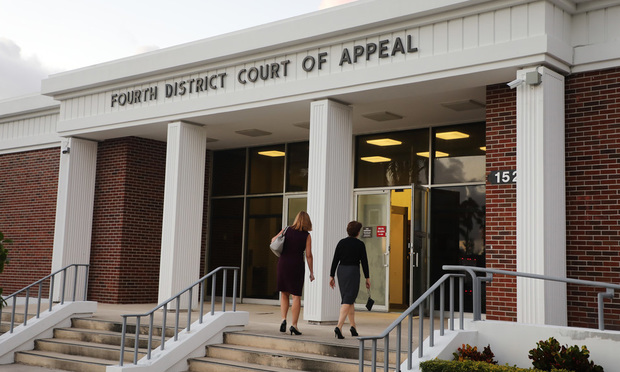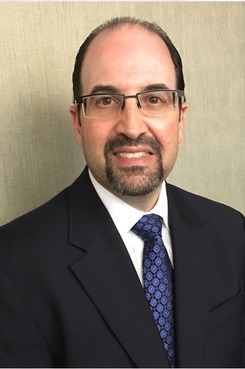Request to View Attorney-Client Communication Is Central Issue in Public Records Dispute
The appellate ruling marks the latest turn in the Sunshine Law litigation saga between plaintiff Martin O'Boyle and officials of Gulf Stream, a town in Palm Beach County.
October 31, 2018 at 06:17 PM
5 minute read
 Fourth District Court of Appeal. Photo: J. Albert Diaz
Fourth District Court of Appeal. Photo: J. Albert Diaz
The Fourth District Court of Appeal has issued an opinion in favor of a Gulf Stream resident who had sought to obtain the town mayor's text message conversations along with unredacted bills sent to the city by outside counsel.
The appellate court reversed a Palm Beach Circuit Court's order to dismiss a complaint by plaintiff Martin O'Boyle, who accused Gulf Stream Mayor Scott Morgan of violating the Florida Constitution and Public Records Act.
The underlying suit also named the town as a defendant, as well as attorneys John Randolph, Robert Sweetapple and Joanne O'Connor, who all serve as outside counsel to Gulf Stream, a town in Palm Beach County.
O'Boyle is the founder of the Citizen's Awareness Foundation, a group that claims to be dedicated to educating constituents on the availability of Florida public records. He has previously been accused by city officials of running a grift to collect attorney fees through frivolous public information requests.
The feud has generated headlines. In March 2017, for instance, NPR affilliate WUFT reported O'Boyle and his son Jonathan, who also served as his father's appellate attorney, have been locked in a battle with Gulf Stream city officials since 2013, when the town rejected O'Boyle's home renovation application. Earlier, in September 2016, the Palm Beach Post had reported Gulf Stream filed a RICO complaint against O'Boyle alleging he and his son had engaged in a conspiracy to profiteer through Chapter 119 of the Florida statutes.
The complaint asserted that O'Boyle's son would file complaints once agencies were overwhelmed by the Citizen's Awareness Foundation's voluminous record requests and unable to respond to each one properly. News reports indicate O'Boyle's records requests were so excessive that state legislation has been drafted directly in response.
Private Devices Used for Public Business
Now, the Fourth DCA has weighed in on the feud. It found Palm Beach Circuit Judge David E. French properly dismissed O'Boyle's Sunshine Law claims, as well as allegations the town violated Chapter 286 of the Florida statutes.
But the unanimous opinion, authored by Judge Mark Klingensmith and released Oct. 24, held that the lower court erred in dismissing claims under the Public Records Act.
The plaintiff had alleged the mayor and town “cherry picked” and “deliberately concealed” the texts shared through a records request. But Klingensmith cited a Florida Supreme Court ruling establishing that ” 'private' or 'personal' e-mails 'simply fall outside the current definition of public records,' ” and that the “ determination of whether something is a public record is a question of law subject to de novo review and is determined on a case-by-case basis.”
Read the opinion:
“To comply with the dictates of the act, the governmental entity must proceed as it relates to text messaging no differently than it would when responding to a request for written documents and other public records in the entity's possession — such as emails — by reviewing each record, determining if some or all are exempted from production, and disclosing the unprotected records to the requester,” Klingensmith wrote.
The ruling also noted that if public officials use text messages to conduct official government business, “a process must be available to offer the public a way to obtain those records and resolve disputes about the extent of compliance.”
The opinion also found the Public Records Act would be undermined if public data stored on private devices were exempt from records requests.
“We acknowledge that the public's statutory right to public records does not extinguish an individual's constitutional and statutory rights in private information. But we do not read Article I, section 24 or the Public Records Act as a zero-sum choice between personal liberty and government accountability,” Klingensmith wrote. “Accordingly, the Town's reasons for its lack of disclosure, whether for reasons related to relevancy, the application of possible privileges, or otherwise, necessitates a judicial review of the available communications to identify those which are subject to disclosure and any defenses to allegations of noncompliance.”
The appellate panel then instructed the trial court to perform an in camera, or private, review of all the mayor's text exchanges since he assumed office to see which are public records. It also ordered the lower court to determine whether the plaintiffs are entitled to legal fees and court costs.
 David Weinstein of Hinshaw & Culbertson. Courtesy photo
David Weinstein of Hinshaw & Culbertson. Courtesy photoIn analyzing the ruling, Miami-based attorney and Hinshaw & Culbertson partner David S. Weinstein told the Daily Business Review that the circuit court must now determine whether the delivery of the redacted bills was proper, and in the event they were not, what fees ought to be awarded to the prevailing party.
“The issue that remains is whether or not there are going to be any costs associated with this,” said Weinstein, who is not involved in the litigation.
Neither O'Boyle's nor Gulf Stream's counsel responded to requests for comment by press time.
Related stories:
Federal Judge Blocks Releasing Records on FIU Bridge Collapse
Attorneys Weigh in as Judge in Parkland Shooting Case Threatens to Hold Sun Sentinel in Contempt
This content has been archived. It is available through our partners, LexisNexis® and Bloomberg Law.
To view this content, please continue to their sites.
Not a Lexis Subscriber?
Subscribe Now
Not a Bloomberg Law Subscriber?
Subscribe Now
NOT FOR REPRINT
© 2025 ALM Global, LLC, All Rights Reserved. Request academic re-use from www.copyright.com. All other uses, submit a request to [email protected]. For more information visit Asset & Logo Licensing.
You Might Like
View All
What Is Exhibit J? Litigators Are Watching This AI Test Case

Reveal Acquires LIGL, Adds Workflow Automation and Legal Hold Capabilities to Reveal 11 Platform
5 minute read
The E-Discovery 502(d)ilemma: Attorneys Continue to Neglect an 'Amazing Level of Protection'

Trending Stories
- 1Bill Would Consolidate Antitrust Enforcement Under DOJ
- 2Cornell Tech Expands Law, Technology and Entrepreneurship Masters of Law Program to Part Time Format
- 3Divided Eighth Circuit Sides With GE's Timely Removal of Indemnification Action to Federal Court
- 4Former U.S. Dept. of Education Attorney Suspended for Failure to Complete CLE Credits
- 5ArentFox Schiff Adds Global Complex Litigation Partner in Los Angeles
Who Got The Work
J. Brugh Lower of Gibbons has entered an appearance for industrial equipment supplier Devco Corporation in a pending trademark infringement lawsuit. The suit, accusing the defendant of selling knock-off Graco products, was filed Dec. 18 in New Jersey District Court by Rivkin Radler on behalf of Graco Inc. and Graco Minnesota. The case, assigned to U.S. District Judge Zahid N. Quraishi, is 3:24-cv-11294, Graco Inc. et al v. Devco Corporation.
Who Got The Work
Rebecca Maller-Stein and Kent A. Yalowitz of Arnold & Porter Kaye Scholer have entered their appearances for Hanaco Venture Capital and its executives, Lior Prosor and David Frankel, in a pending securities lawsuit. The action, filed on Dec. 24 in New York Southern District Court by Zell, Aron & Co. on behalf of Goldeneye Advisors, accuses the defendants of negligently and fraudulently managing the plaintiff's $1 million investment. The case, assigned to U.S. District Judge Vernon S. Broderick, is 1:24-cv-09918, Goldeneye Advisors, LLC v. Hanaco Venture Capital, Ltd. et al.
Who Got The Work
Attorneys from A&O Shearman has stepped in as defense counsel for Toronto-Dominion Bank and other defendants in a pending securities class action. The suit, filed Dec. 11 in New York Southern District Court by Bleichmar Fonti & Auld, accuses the defendants of concealing the bank's 'pervasive' deficiencies in regards to its compliance with the Bank Secrecy Act and the quality of its anti-money laundering controls. The case, assigned to U.S. District Judge Arun Subramanian, is 1:24-cv-09445, Gonzalez v. The Toronto-Dominion Bank et al.
Who Got The Work
Crown Castle International, a Pennsylvania company providing shared communications infrastructure, has turned to Luke D. Wolf of Gordon Rees Scully Mansukhani to fend off a pending breach-of-contract lawsuit. The court action, filed Nov. 25 in Michigan Eastern District Court by Hooper Hathaway PC on behalf of The Town Residences LLC, accuses Crown Castle of failing to transfer approximately $30,000 in utility payments from T-Mobile in breach of a roof-top lease and assignment agreement. The case, assigned to U.S. District Judge Susan K. Declercq, is 2:24-cv-13131, The Town Residences LLC v. T-Mobile US, Inc. et al.
Who Got The Work
Wilfred P. Coronato and Daniel M. Schwartz of McCarter & English have stepped in as defense counsel to Electrolux Home Products Inc. in a pending product liability lawsuit. The court action, filed Nov. 26 in New York Eastern District Court by Poulos Lopiccolo PC and Nagel Rice LLP on behalf of David Stern, alleges that the defendant's refrigerators’ drawers and shelving repeatedly break and fall apart within months after purchase. The case, assigned to U.S. District Judge Joan M. Azrack, is 2:24-cv-08204, Stern v. Electrolux Home Products, Inc.
Featured Firms
Law Offices of Gary Martin Hays & Associates, P.C.
(470) 294-1674
Law Offices of Mark E. Salomone
(857) 444-6468
Smith & Hassler
(713) 739-1250






